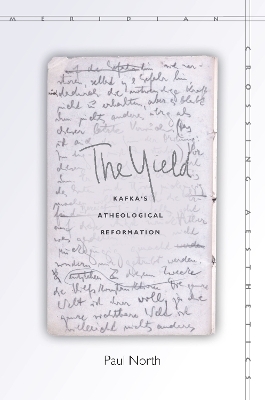
The Yield
Stanford University Press (Verlag)
978-0-8047-9445-9 (ISBN)
The Yield is a once-in-a-generation reinterpretation of the oeuvre of Franz Kafka. At the same time, it is a powerful new entry in the debates about the supposed secularity of the modern age. Kafka is one of the most admired writers of the last century, but this book presents us with a Kafka few will recognize. It does so through a fine-grained analysis of the three hundred "thoughts" the writer penned near the end of World War I, when he had just been diagnosed with tuberculosis.
Since they were discovered after Kafka's death, the meaning of the so-called "Zürau aphorisms" has been open to debate. Paul North's elucidation of what amounts to Kafka's only theoretical work shows them to contain solutions to problems Europe has faced throughout modernity. Kafka offers responses to phenomena of violence, discrimination, political repression, misunderstanding, ethnic hatred, fantasies of technological progress, and the subjugation of the worker, among other problems. Reflecting on secular modernity and the theological ideas that continue to determine it, he critiques the ideas of sin, suffering, the messiah, paradise, truth, the power of art, good will, and knowledge. Kafka's controversial alternative to the bad state of affairs in his day? Rather than fight it, give in. Developing some of Kafka's arguments, The Yield describes the ways that Kafka envisions we can be good by "yielding" to our situation instead of striving for something better.
Paul North is Professor of German at Yale University and author of The Problem of Distraction (Stanford, 2012).
Contents and AbstractsIntroduction: Introduction chapter abstractThe introduction describes the historical and intellectual contexts for the composition of the "thoughts" Kafka wrote in the winter of 1917–18. It offers an analysis of the genre of these texts and locates Kafka's models for it. At a point in history when the category "Jew" had lost a lot of its meaning for those in Kafka's milieu, Kafka turned to the Book of Genesis to construct a new Judaism out of the contradictions in the originary legends. He does this, following the example of Pascal, in the format of "thoughts," though Kafka's aim not to console but to terrify. The thoughts are intricately interconnected such that they have to be read traversely.
1Refutation of What Being Never Was chapter abstractUnlike Martin Heidegger ten years later, Kafka wants to eradicate "being" from our conceptual vocabulary. This division demonstrates Kafka's arguments for why being is equivalent to "having" in the Western tradition, and the division then gives Kafka's analysis a genealogy, tracing the hidden presence of "having" and "possession" in conceptualizations of being from Aristotle to Kant, paying special attention to the construction of tables of categories. It demonstrates how Kafka exposes the "possessive" undergirding of language and in the concepts of things and of the self.
2Better Weapons Than Faith and Hope chapter abstractThe set of "thoughts" treated in this division exposes the dependence of the sequential, directional time concept on the attitude of faith and proposes various experiments to lead us to drop our concept of time. Antinomies of the garden of Eden and of the messianic idea are presented in order to frustrate faith and lead to a milieu with no time.
3The Problem of Our Art chapter abstractThis division presents Kafka's claim that human beings never die—there is no evidence that they are finite, although this does not mean they are immortal. Kafka imagines a third alternative, an indefinite finitude. Kafka's critique of temporality challenges us to think of ways to live when life means something like "being indefinite," rather than being certainly defined by an ultimate limit, whether the other side is heaven or nothingness. Death is treated as an image, an illusion, and the rest of the chapter describes Kafka's critical techniques for working with images such as the image of death, in order that they lose their hypnotic power over human beings.
4The Yield: On Forgoing Power chapter abstractThis division presents Kafka's critique of the will, with reference to Nietzsche and also briefly to Schopenhauer. On one hand the division describes the ontological basis for a world without power. Kafka's cosmos has no room for any becoming; everything can be no more than it is, and so it cannot use power to become something it is not. On the other hand, for anything to be anything depends on a prior yielding. After a critique of Nietzsche's obsession with struggle and a critique of Heidegger's own critique of the will, the chapter describes Kafka's attempt to articulate how human beings come to yield and what a world of yielding beings looks like.
| Erscheint lt. Verlag | 30.9.2015 |
|---|---|
| Reihe/Serie | Meridian: Crossing Aesthetics |
| Verlagsort | Palo Alto |
| Sprache | englisch |
| Maße | 152 x 229 mm |
| Gewicht | 680 g |
| Themenwelt | Geisteswissenschaften ► Philosophie |
| Geisteswissenschaften ► Religion / Theologie | |
| Geisteswissenschaften ► Sprach- / Literaturwissenschaft ► Anglistik / Amerikanistik | |
| Geisteswissenschaften ► Sprach- / Literaturwissenschaft ► Literaturwissenschaft | |
| ISBN-10 | 0-8047-9445-6 / 0804794456 |
| ISBN-13 | 978-0-8047-9445-9 / 9780804794459 |
| Zustand | Neuware |
| Haben Sie eine Frage zum Produkt? |
aus dem Bereich


